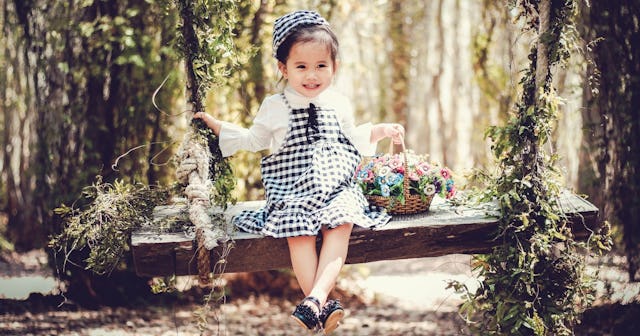Your 28-30 Month Old Toddler — Physical, Social, And Cognitive Milestones

You know what’s great about this age? Although you’re still technically in your toddler’s “terrible twos,” you also have a wonderful little buddy who — when they aren’t being willful — loves to be Mommy’s big helper. And since your 28- to 30-month-old toddler is moving all over the place now and capable of more every day, you’re happy for and impressed by the extra assistance.
Curious about what else is happening in your baby’s development during this time period? Here are some of the 28- to 30-month-old toddler milestones you might see in these months.
Your 28 – 30-Month-Old Toddler’s Development & Growth Milestones
How much should a 28 – 30-month-old weigh?
Your little one continues to slowly but surely put on a little weight at a time. Per the U.S. Centers for Disease Control, the average weight for a 28- to 30-month-old toddler girl is between around 28.1 and 28.8 pounds for girls and between 29.3 and 29.9 for boys.
How much, and what, should a 28 – 30-month-old be eating?
While it’s still possible you have a finicky feeder on your hands, it’s just as possible your little one has found good reason to get past that stage: self-feeding! Your 28- to 30-month-old has likely mastered this art, even using utensils like a fork to accomplish their purpose. They may not be the most graceful of mess-free spoon-users yet, but they’re working on it.
Your 28- to 30-month-old toddler should still be getting three meals and two snacks per day served as a variety of foods spanning all food groups. Portions shouldn’t be huge — think ¼ to ½ as much as an adult. Also, at this point, your toddler can transition to skim or 1 percent milk (not whole) to keep up with calcium without adding unnecessary sugar and fat.
How much should a 28- to 30-month-old baby sleep?
Sleep is incredibly important for your child’s brain development (not to mention keeping their moods balanced), so it’s necessary for your little one to get in a solid amount of shuteye. For a 28- to 30-month-old, that means 11 to 12 hours of nighttime sleep, plus about 1 ½ to 3 hours of napping for a total of around 13 to 14 hours of sleep per day.
If your toddler decides they’re no longer interested in naps, try to encourage them by instituting mandatory quiet time each afternoon. Chances are your child will fall asleep if given nothing else to do but rest. If you really can’t get them to come back around to napping, it’s probably time to consider an earlier bedtime, later wakeup call, or both.
Your 28 – 30-Month-Old Toddler’s Physical, Social, And Cognitive Milestones
What physical activities should my toddler be doing at 28- to 30-months-old?
Walking? Check. Running? Check. Going up and down stairs (what feels like a million times a day)? Check. Your toddler is moving so much these days, you might have trouble keeping up. They can kick and throw a ball, jump, build a tower of blocks and, basically, be the bundle of energy you only wish you were.
How much should a baby be talking at 28 – 30-months-old?
You’ve entered the tiny sponge stage, Mama, so watch what you say. Your little one is soaking up words left and right. True, they don’t necessarily know what all of them mean and they may still say them a little funny, but they’ll learn to use language properly over time. A 28- to 30-month-old toddler should be able to speak around 100 to 250 words or more, follow directions with up to four steps, and comprehend enough to help you out when asked.
As always, it’s vital to remember that all children develop at different paces. What’s normal for one toddler may look totally different than what’s normal for yours. If you’re concerned about your toddler’s language skills, call it to your pediatrician’s attention.
What are some behavioral issues a 28- to 30-month-old might have?
At 28- to 30-months-old, your toddler nests firmly in the crook of willful disobedience. You want them to do something, they want to do something else, and thus a battle of the wills ensues. Make no mistake; there will be times during these months that you’ll need patience and enough grit to stand your ground.
On the plus side, since tantrums tend to peak between 17 and 24 months, you may soon see your toddler’s behavior start to markedly improve.
Should a 28- to 30-month-old be potty training?
Just like language skills, potty training is something that is entirely subjective. Some 28- to 30-month-old toddlers are completely potty trained. Others haven’t even shown much inclination to start. Generally speaking, though, most children find success with potty training between 27 and 32 months. So, if your little one seems interested right now, help them along with practice, board books, and other forms of encouragement.
Your 28- to 30-Month-Old Toddler’s Health
Should my 28- to 30-month-old toddler have a checkup?
Yep! At 30 months or 2 ½ years, your child’s pediatrician will want to touch base to see how your little one is progressing. You can expect much of the same you’ve experienced at prior appointments: measurements (weight, height, BMI), screening tests for developmental delays, and Q&A time. The latter will be used for your toddler’s doctor to gauge whether their eating, talking, sleeping, behavior, and development seem healthy, as well as for you to air out any concerns you may have.
Will my 28- to 30-month-old toddler get any immunizations?
If you haven’t yet, you may consider getting your toddler’s annual influenza (flu) vaccine during this time period.
Written by Julie Sprankles.
Read More:
Your 31-33 Month Old Toddler — Physical, Social, And Cognitive Milestones
This article was originally published on